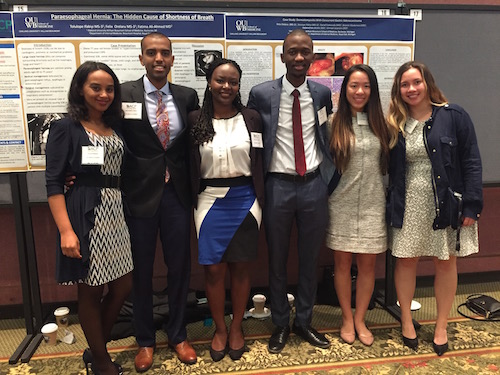
Poster presentations provide students with valuable experience
Six OUWB students attended the American College of Physicians (ACP) Conference in Traverse City, where they presented research posters before peers, judges and health care professionals.
Among the six were M2 Rachel Shercliffe and M3 Felix Orelaru, both of whom presented case reports in which they discussed their respective work with, and on, a singular patient and case.
In an effort to bring awareness to adverse yet exceedingly rare side effects that can accompany the use of Viagra, Shercliffe discussed her work with a patient who, while on the drug, experienced swelling of the face.
“What was even more unusual,” Shercliffe says, “was that he was given a different medication in the same category of medications (Phosphodiesterase 5 inhibitors), and he was able to tolerate it just fine.” She hopes that, in shedding light upon this anomaly, others who have or will experience similar unique allergic reactions to Viagra will be more knowledgeable and feel less alone in their afflictions.
Orelaru presented his research on dermatomyositis, which is a rare inflammatory disease categorized by muscle weakness and a distinctive skin rash, as it mingles with gastric cancer.
“Advanced gastric cancers in the settings of dermatomyositis are incurable,” he explains, prompting the necessity of early diagnosis. He selected this topic as the rarity of the particular case intrigued him. “Our patient did not present with (muscle weakness), which is a classic characteristic of dermatomyositis,” he says. “Also, the course of her disease was challenging. Her cancer was very aggressive and resistant to available chemotherapy and radiotherapy.”
Orelaru and Shercliffe, in addition to fellow presenters M3s Mohammed Ahmed and Tolulope Ifabiyi, M2 Danielle Yee and M4 Eman Sahloul attribute their presenting and research skills in part to the OUWB Embark program and to their mentors for this project.
Embark courses prepare students
“OUWB, through the Embark course, has enhanced my abilities to research literatures, identify strong evidence and interpret scientific data,” Orelaru says. Ahmed adds: “We have classes and attend presentations on what to present and what kind of info would be interesting to put out there and would attract people’s attention.”
Dr. Fatima Ali-Ahmed, M.D., an internal medicine pediatrics physician at Beaumont Hospital – Royal Oak who has mentored Ifabiyi throughout the preparation process, taught her mentee the importance of a succinct and explicit conveyance of the significance of her research.
“Having a clear message is a key component to creating an effective, understandable poster that contributes to the current body of literature,” Ifabiyi says.
According to Yee, her mentor Kathleen Dass, M.D., an allergist and immunologist at Beaumont Hospital – Royal Oak, has also done more than give her mere presentation pointers. “The most significant thing I learned from her is to stay determined and to keep pushing forward. I applied for a research fellowship that I was rejected from. Her advice to me was that there will be many ‘no's’ on my journey to becoming a doctor, but I can't get discouraged.”

